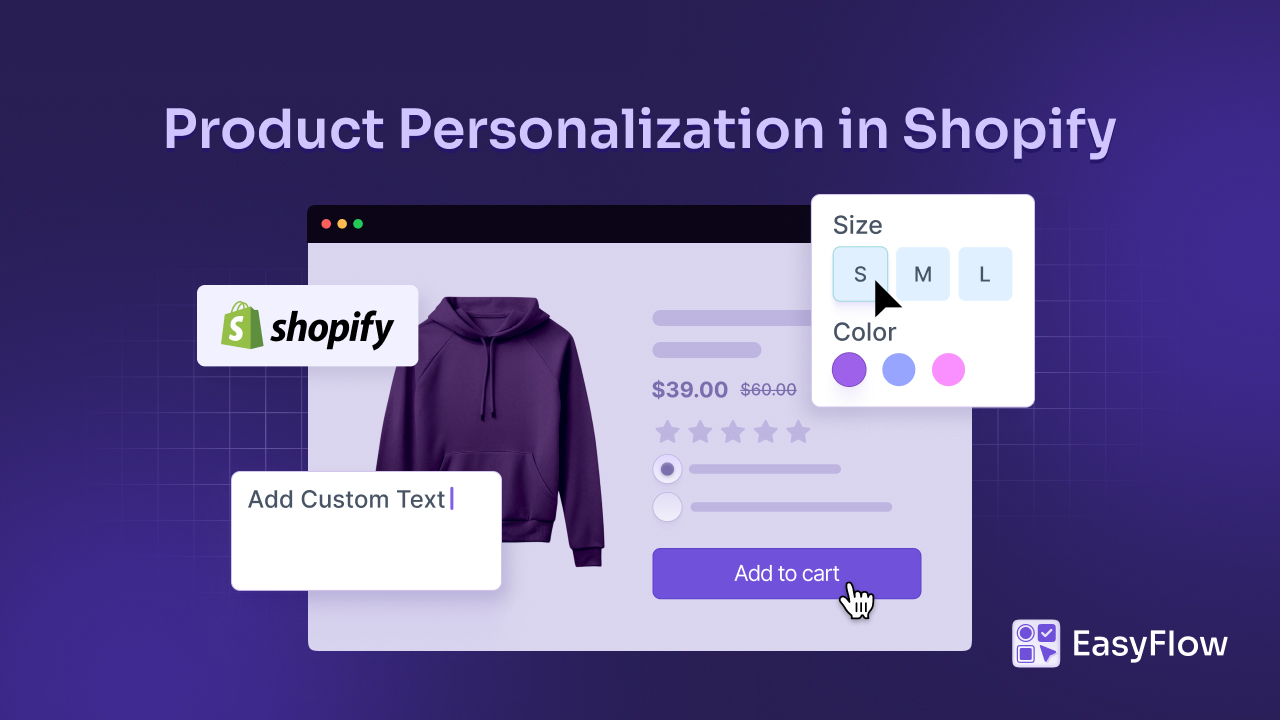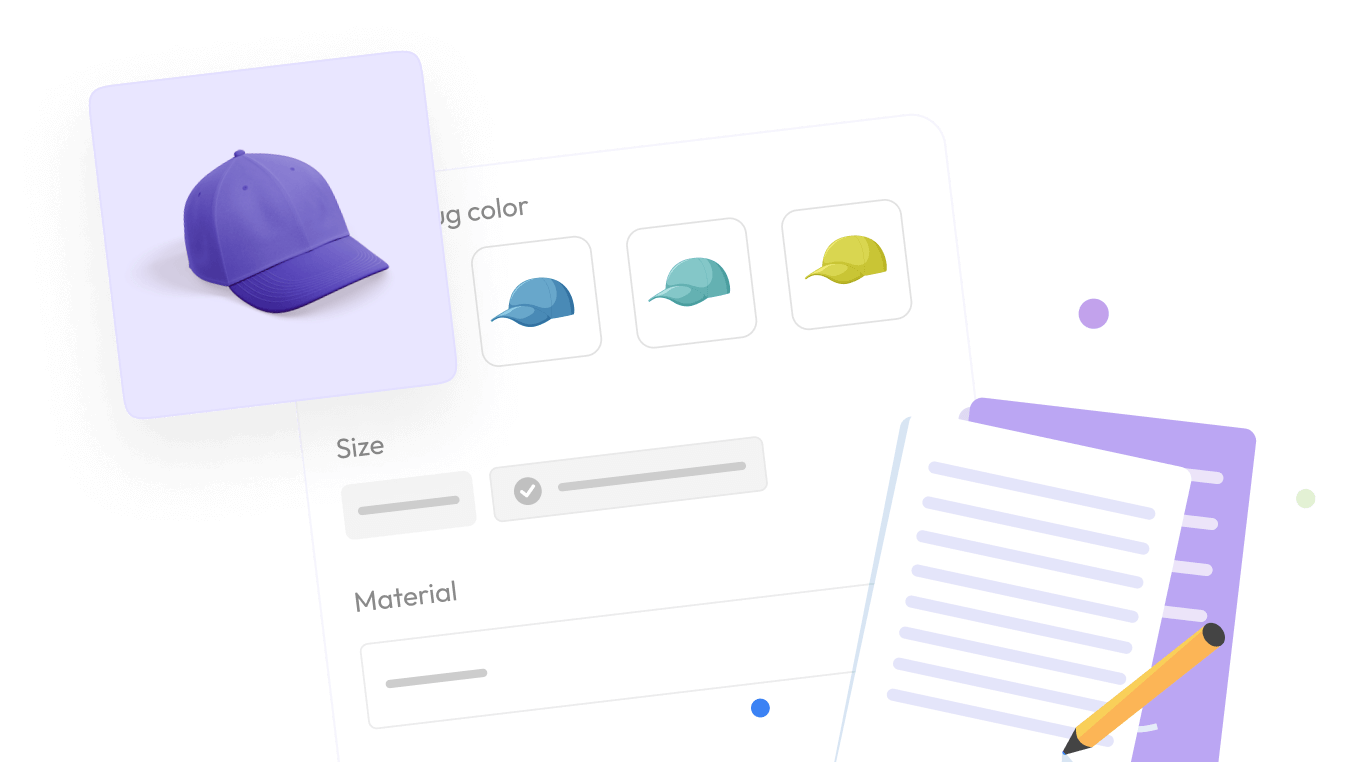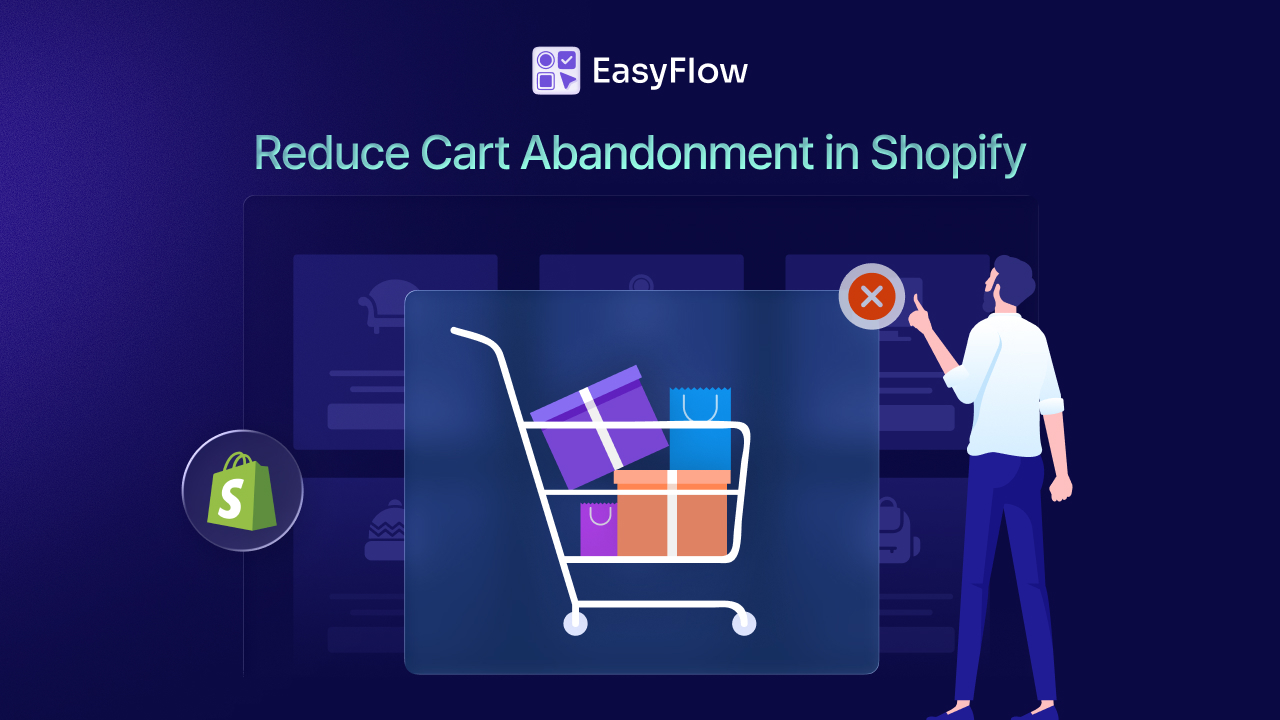Over 4 million businesses worldwide are powered by Shopify. Standing out from others here is tough, which requires more than just having great products. It demands personalized experiences that speak directly to individual customers.

Businesses implementing personalization strategies see customers spending 38% more when they encounter personalized on-site experiences, making product personalization a key driver of revenue.
Let us explore the 5+ most effective ways Shopify product personalization can transform your store’s performance and drive substantial sales growth.
What Is Product Personalization in Shopify?
The eCommerce world is very competitive today. Here, businesses require more than generic shopping experiences. Before diving into specific product personalization strategies, it is crucial to understand why personalization is important for eCommerce businesses.
Recent industry research reveals that 81% of customers prefer companies that offer personalized experiences, while 95% of senior marketers consider their personalization strategies successful.
For Shopify stores specifically, the impact is even greater. According to a survey conducted by LittleData, a good Shopify conversion rate is considered to be above 1.4%, with rates over 3% considered exceptional and top performers exceeding 3.2%.
Stores that implement effective product personalization strategies stay ahead of the benchmark. Many achieve conversion rates well above the exceptional threshold.
5+ Shopify Product Personalization Strategies to Increase Sales
Product personalization in Shopify goes beyond simply addressing customers by their first name in emails. This is about creating shopping experiences that understand customer needs, suggest relevant products, and guide shoppers through a journey that feels unique.
For Shopify store owners, this represents a massive opportunity to boost sales, increase customer lifetime value, and build lasting brand loyalty. Below are the top 5+ product personalization strategies that increase Shopify sales:
Dynamic Product Recommendations
Dynamic product recommendations represent the cornerstone of effective eCommerce personalization, and for good reason. Personalized product recommendations can increase average order value by an impressive 369% compared to generic recommendations. This dramatic improvement stems from the system’s ability to analyze customer behavior, purchase history, and browsing patterns to suggest products that genuinely resonate with individual shoppers.
For Shopify stores, implementing dynamic recommendations involves utilizing customer data to create sophisticated recommendation engines. These systems track various signals. Such as,
- Products viewed
- Time spent on pages
- Items added to cart
- Purchase history,
- Seasonal preferences.
These data points combine to predict what products a customer is most likely to purchase next. The most effective recommendation strategies go beyond simple “customers who bought this also bought that” algorithms. Advanced systems consider factors like
- Price sensitivity,
- Brand preferences,
- Size and color choices,
- Browsing device to create truly personalized suggestions.
For instance, a customer who consistently purchases premium brands and views products on mobile during evening hours might receive different recommendations than someone who shops budget-friendly items on a desktop during work hours.
Research shows that 56% of online customers are more likely to return to a site that offers product recommendations, directly impacting customer retention and lifetime value. For Shopify merchants, this translates to not just higher immediate sales but stronger long-term customer relationships that drive sustainable growth.
Implementation on Shopify can be achieved through various apps and built-in features. The key is ensuring recommendations appear at strategic touchpoints throughout the customer journey: on product pages, in the shopping cart, during checkout, and in post-purchase communications. The most successful Shopify stores also implement cross-sell and upsell recommendations that feel natural and helpful rather than pushy or irrelevant.
Product Options & Customizable Variants

Offering customizable product options is one of the smartest ways to enhance both your customers’ experience and your store’s efficiency. Instead of creating separate listings for every product variation, you can provide flexible options. This includes size, color, or even a custom text field, all under a single product page.
This not only makes your catalog easier to manage but also gives shoppers the freedom to personalize their orders exactly how they want. Here is why customizable product options are a game-changer:
✅ Personalized Shopping Experience
Give customers the ability to tailor products to their preferences. Whether it is choosing the right fit or adding a personal touch with custom text, this level of personalization leads to greater satisfaction and brand loyalty.
✅ Simplified Inventory Management
Avoid clutter and complexity in your store by using reusable option sets. You can manage all variations from a single product listing, saving time and reducing errors.
✅ Higher Conversions & Upsell Opportunities
Personalized products often feel more valuable, encouraging customers to complete their purchases. Additionally, it opens the door for strategic upselling, such as offering gift wrapping, add-ons, or premium customizations.
If you are looking to scale your Shopify store without overwhelming your backend operations, customizable product options are a crucial tool for delivering value, boosting engagement, and driving sales. EasyFlow can be a powerful Shopify app that you can use for product customization options.
This Shopify app lets you create unlimited product options and variants with ease. Its user-friendly interface offers flexible input types, reusable option sets, and add-on pricing to boost revenue. You can apply rules and conditional logic for dynamic option behavior, and even bundle products effortlessly. With in-depth customization settings, you can tailor every detail to match your brand perfectly.
Personalized Email Marketing and Product Suggestions
Email marketing remains one of the highest ROI channels for eCommerce businesses, but personalization takes its effectiveness to entirely new levels. When product suggestions in personalized emails are relevant to the recipient, it leads to higher engagement rates and conversion rates.
The power of personalized email marketing for Shopify stores lies in its ability to re-engage customers outside the shopping environment. By analyzing customer behavior data from Shopify, merchants can create highly targeted email campaigns that feel less like marketing and more like helpful suggestions from a knowledgeable friend. Effective personalized email strategies for Shopify stores include,
- Abandoned cart recovery emails featuring the exact products left behind
- Related recommendations based on browsing history
Post-purchase emails can suggest complementary products, refill reminders for consumable goods, or seasonal variations of previously purchased items. Birthday and anniversary emails can feature personalized product selections based on past preferences and spending patterns.
The timing of these emails is crucial. Advanced personalization systems analyze when individual customers are most likely to engage with emails, personalizing not just content but delivery timing. Some customers might respond better to morning emails on weekdays, while others engage more with weekend afternoon communications.
For Shopify merchants, the integration between email platforms and store data creates opportunities for sophisticated segmentation. Customers can be grouped by
- Purchase frequency
- Average order value
- Product categories
- Geographic location and other variables.
Such segmentation enables highly targeted campaigns that speak directly to specific customer segments’ needs and preferences. Looking ahead to 2025, 55% of email marketers plan to focus specifically on personalization for higher engagement rates. This trend reflects the growing recognition that generic email blasts are becoming increasingly ineffective as consumers expect more relevant, tailored communications.
Customized Landing Pages And User Experiences
The moment a customer lands on your Shopify store, personalization should begin shaping their experience. Customized landing pages and user experiences can dramatically improve conversion rates by presenting relevant content, products, and messaging that resonates with individual visitors or specific customer segments.
The foundation of personalized landing pages lies in understanding different customer journeys and motivations. A first-time visitor arriving from a social media ad requires a different experience than a returning customer who previously abandoned their cart. Similarly, customers from different geographic regions, age groups, or referral sources may respond better to tailored messaging and product presentations.
For Shopify stores, personalized landing pages can be created for different traffic sources, customer segments, and product categories. A customer who frequently purchases athletic wear might see a homepage featuring the latest sports apparel and fitness accessories, while someone with a history of buying formal wear encounters elegant suits and professional attire upon arrival.

Geographic personalization adds another powerful layer. Customers in colder climates can be greeted with seasonal outerwear and warm accessories, while those in warmer regions see summer collections and lightweight options. Currency, language, and cultural preferences can also be automatically adjusted based on visitor location.
The impact on conversion rates can be substantial. When website content lacks personalization, 74% of customers express frustration, often leading to immediate site abandonment. Conversely, personalized experiences that make navigation easier and more intuitive contribute to higher engagement, longer session durations, and increased purchase likelihood.
Behavioral triggers enable real-time personalization that adapts as customers interact with the site. First-time visitors might see welcome messages and popular product categories, while returning customers encounter recently viewed items and personalized recommendations. Customers who spend a significant amount of time browsing without making a purchase can be presented with special offers or alternative product suggestions.
The technology behind personalized landing pages continues to evolve, with many Shopify apps now offering sophisticated segmentation and content customization options. The most successful implementations strike a balance between personalization and performance, ensuring that customized experiences load quickly and function seamlessly across all devices.
Personalized Pricing And Promotional Strategies
Personalized pricing and promotional strategies represent one of the most sophisticated forms of eCommerce personalization. It has the potential to significantly boost both conversion rates and customer loyalty. This approach goes beyond one-size-fits-all discounts to offer tailored pricing and promotions that reflect individual customer value, purchase history, and engagement levels.
The foundation of personalized pricing lies in customer segmentation and lifetime value analysis. High-value customers who make frequent purchases and have demonstrated loyalty might receive exclusive early access to sales or special member pricing. Price-sensitive customers identified through browsing behavior and cart abandonment patterns could be targeted with strategic discounts that encourage purchase completion.
For Shopify stores, personalized promotional strategies can include tiered loyalty programs that unlock better pricing as customers increase their engagement and spending. Dynamic discount codes can be automatically generated based on customer behavior, offering the minimum discount necessary to convert a hesitant shopper while preserving profit margins for less price-sensitive customers.
Abandoned cart recovery represents a prime opportunity for personalized pricing strategies. Rather than offering the same discount to all cart abandoners, sophisticated systems can analyze factors like cart value, customer history, and time since abandonment to determine optimal incentive levels. A new customer with a high-value cart might receive a smaller discount than a price-sensitive repeat customer with a modest cart value.
The psychological impact of personalized pricing extends beyond the immediate transaction. When customers feel they are receiving special treatment or exclusive offers, it builds an emotional connection to the brand and increases the likelihood of future purchases. This is particularly powerful when combined with personalized messaging that acknowledges the customer’s relationship with the brand.
Seasonal and event-based personalization adds another dimension to pricing strategies. Customers can receive birthday discounts, anniversary offers marking their first purchase, or personalized holiday promotions based on their cultural background and preferences. These touchpoints create memorable experiences that extend far beyond simple transactions.
Implementation requires a careful balance between personalization and fairness. The goal is to optimize pricing for both conversion and customer satisfaction, avoiding practices that might be perceived as discriminatory or manipulative. Transparency in loyalty programs and clear communication about how customers can access better pricing helps maintain trust while driving desired behaviors.
AI-Powered Customer Journey Optimization

Artificial intelligence (AI) helps Shopify stores make shopping more personalized for each customer. It checks how people browse and buy, then quickly adjusts things like product suggestions to match their interests. Instead of following fixed rules, AI learns and gets smarter over time, so it keeps improving the shopping experience as customers’ needs change.
AI is super powerful in online shopping because it can look at tons of data and spot patterns that people might miss. It checks things like how fast you browse, what you click on, what device you are using, the time of day, seasons, and even social media activity. All this helps create a detailed profile of each customer to make shopping more personal.
For Shopify store owners, AI can automatically change what products you see, recommend the best content, suggest prices, and even guess when you are most likely to buy something. The more you interact, the smarter the system gets at understanding your preferences and giving better recommendations.
One of the best things about AI is real-time personalization. As you shop, AI can change the experience right away based on what you are doing. For example, if you spend a lot of time looking at product pictures, the store might show you bigger, clearer images. If you focus on product details, it might show you comparison charts or technical info.
AI can also predict what you might want before you even say it. It can spot if you are about to stop shopping and offer a deal to keep you interested or notice if you are ready to upgrade to a fancier product. This makes shopping feel smooth and even a bit magical.
When AI teams up with other personalization tools, it works even better. For example, AI can figure out the best time to send you an email or change prices based on how many people want a product right now. Recommendations get smarter as AI learns from what customers like and buy.
Also, you can use AI-powered documentation apps as well for customer support management. Tools like BetterDocs for Shopify allows you to create documentation for your Shopify store with useful AI writing features.
Looking ahead, AI will keep getting better with new tech like voice shopping, virtual reality, and chatbots that talk like real people. These will make personalized shopping even easier and more fun.
Product Personalization in Shopify: Key Metrics And KPIs
For Shopify stores investing in personalization, tracking the right metrics is essential for understanding impact, optimizing performance, and justifying continued investment.
👉 The most fundamental metric is conversion rate improvement. Since the average Shopify store converts at 1.4%, any personalization strategy should aim to move this needle upward. However, it is important to segment conversion rates by customer type, traffic source, and personalization strategy to understand which approaches deliver the strongest results.
👉 Average order value provides another critical measurement point. With personalized product recommendations increasing AOV by up to 369% in some cases, tracking this metric reveals the financial impact of recommendation engines and cross-selling strategies. Comparing AOV between personalized and non-personalized customer segments helps quantify the direct revenue impact of personalization efforts.
👉 Customer lifetime value represents the long-term impact of personalization on business growth. While immediate conversion improvements are important, the real value of personalization often emerges over time as customers develop stronger relationships with brands that understand their preferences. Tracking CLV helps justify personalization investments that might have longer payback periods but deliver substantial long-term returns.
👉 Engagement metrics provide insights into how personalization affects customer behavior. Time on site, pages per session, and bounce rate all indicate whether personalized experiences are successfully capturing and maintaining customer attention. Email open rates, click-through rates, and unsubscribe rates reveal the effectiveness of personalized email marketing campaigns.
👉 Return customer rates and purchase frequency metrics demonstrate whether personalization is building lasting customer relationships. Since acquiring new customers costs significantly more than retaining existing ones, improvements in these metrics often translate to substantial long-term profitability gains.
Implement the Shopify Product Personalization Strategies & Enhance Growth
Product personalization has evolved from a competitive advantage to a business necessity for Shopify stores seeking sustainable growth. Success with personalization requires a commitment to data-driven decision making, continuous testing and optimization, and genuine focus on customer value rather than short-term sales gains. The most effective personalization strategies create win-win scenarios where customers receive more relevant, helpful experiences while businesses achieve their growth objectives.
As AI technology continues advancing and customer expectations continue rising, personalization will only become more sophisticated and essential. Shopify store owners who invest in building strong personalization capabilities today will be well-positioned to succeed in tomorrow’s even more competitive ecommerce environment.
The time to act is now. Start with one personalization strategy, measure its impact carefully, and gradually expand your efforts as you learn what resonates most with your unique customer base.
If you found this blog helpful, please subscribe for more expert guides, tutorials, and tips on unlocking the full potential of your Shopify store.















